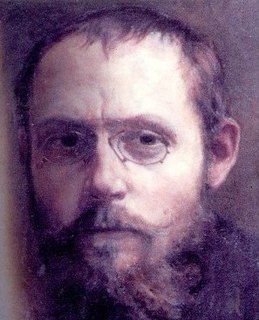A Quote by Francois de La Rochefoucauld
When a man must force himself to be faithful in his love, this is hardly better than unfaithfulness.
Related Quotes
Condemn no man for not thinking as you think. Let every one enjoy the full and free liberty of thinking for himself. Let every man use his own judgment, since every man must give an account of himself to God. Abhor every approach, in any kind or degree, to the spirit of persecution, if you cannot reason nor persuade a man into the truth, never attempt to force a man into it. If love will not compel him to come, leave him to God, the judge of all.
Man—every man—is an end in himself, not a means to the ends of others; he must live for his own sake, neither sacrificing himself to others nor sacrificing others to himself; he must work for his rational self-interest, with the achievement of his own happiness as the highest moral purpose of his life.
He must also know evil, hate and bigotry as real phenomena, but he must see love as the greater force. He must not doubt this even for a moment or he is lost. His only salvation is to dedicate himself to love, in the same fashion as Gandhi did to militant nonviolence, as Socrates to truth, as Jesus did to love and as More did to integrity. Only then will he have the strength to combat the forces of doubt, confusion and contradiction. He can depend upon no on or no thing for reinforcement and assurance but himself.
From the point of view of the Christian faith, man comes in the profoundest sense to himself not through what he does but through what he accepts. He must wait for the gift of love, and love can only be received as a gift... One must wait for it, let it be given to one. And one cannot become wholly man in any other way than by being loved, by letting oneself be loved... If he declines to let himself be presented with the gift, then he destroys himself.
It is not a slight thing, gentlemen, to force a man to say what he is, or what he believes himself to be; for that supreme word of man, that single expression which he utters of and upon himself is decisive. It lays down the basis upon which all judgment of him is to be formed. From that moment all the acts of his life must correspond to the answer given by him.
No man could bring himself to reveal his true character, and, above all, his true limitations as a citizen and a Christian, his true meannesses, his true imbecilities, to his friends, or even to his wife. Honest autobiography is therefore a contradiction in terms: the moment a man considers himself, even in petto, he tries to gild and fresco himself. Thus a man's wife, however realistic her view of him, always flatters him in the end, for the worst she sees in him is appreciably better, by the time she sees it, than what is actually there.
Man can will nothing unless he has first understood that he must count on no one but himself; that he is alone, abandoned on earth in the midst of his infinite responsibilities, without help, with no other aim than the one he sets himself, with no other destiny than the one he forges for himself on this earth.


































